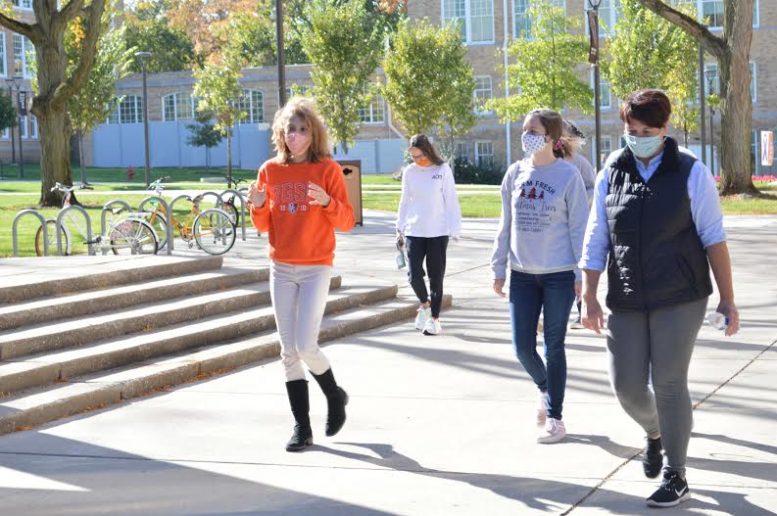BY: SUSAN TEBBEN
A study led by researchers at Ohio State University showed adolescent males had worsened mental health during the pandemic.
“It made my whole life weird,” said one participant in response to a question about how the COVID-19 pandemic impacted them.
In the study, recently published in the Journal of Adolescent Health and co-led by researchers at Kenyon College, nearly 32% of participants reported a worsened mood since March 15, 2020, the date when Ohio closed restaurants and businesses to avoid COVID-19 spread.
Nearly 33% of participants reported increased anxiety since that date.
“Physical distancing measures, which reduce coronavirus transmission, have led to feelings of isolation during the pandemic,” according to the study. “Which is concerning because studies conducted over the past 70 years suggest that loneliness and isolation increase the risk of depression and possibly anxiety among previously healthy children and adolescents.”
The study cited nationwide research that showed a 25% increase in thoughts of suicide among young adults aged 18-24 years in June of 2020.
“Moreover, 25% of young adults used substances to deal with the stress of the pandemic, and 75% had at least one mental or behavioral health symptom during the past 30 days (before June 2020),” the study stated.
Results in the study came from an online survey conducted in June of last year of male pre-teens and teens. 80% of the 571 kids who participated in the survey reported being while, and 8.8% were Black.
Survey overseers said 3/4 of the survey takers came from households with an income of more than $50,000, and the average age of those taking the survey was 18.5 years.
A departure from the study author’s hypothesis was the connection between a higher socio-economic status and an increase in mental health impacts.
For those in households with a higher socio-economic status, one or more parents are likely to be working from home, along with the stay-at-home schooling the children are doing.
“With more family members at home, there are more changes to the family’s daily routine, possibly leading to more stress in the household,” the study found.
The authors of the study said a study of adolescent females could find a different result, and in at least one other study, has shown a more negative COVID-19 impact for females.
The study conclusions matched previous comments from legislators and child care advocates during the pandemic, saying strategies to improve mental health and youth wellbeing should be given priority as the pandemic restrictions disappear.
The state saw examples of the mental health decline in students, for example in Hilliard City Schools, where 84 students were hospitalized for mental health issues during the pandemic, as the OCJ previously reported.
“When we reach the other side of this global pandemic, researchers should examine the factors that promoted resilience among youth and develop interventions to strengthen their ability to cope with stressful and uncertain situations,” the study stated.
***
Also from Ohio Capital Journal:
Ohio pharmacists, care provider say Dayton program is a national model
DAYTON — Ziks Family Pharmacy in the historic Wright-Dunbar neighborhood here has been participating in a program that it and Dayton-based CareSource hope will serve as a national model. Now some results are in.
CareSource, a Medicaid managed-care provider, for a year has been paying Ziks not just to fill prescriptions, but to do diagnostic tests and help patients manage chronic conditions such as diabetes, asthma, blood pressure and smoking cessation.
The Ohio Department of Medicaid pays CareSource a set amount each month for each client it serves, so it makes sense for the company to try to keep them healthy as possible and this keep medical expenses down. But until the Ohio General Assembly in 2019 passed a law giving pharmacists “provider status,” there was no way to pay the medical professionals to do anything other than to dispense drugs.
The resulting system has been particularly difficult for community pharmacies in urban centers and rural areas — places where people often are least likely to have easy access to health professionals. READ MORE
Florida, Missouri, Texas accounted for 40% of COVID-19 cases last week
WASHINGTON — Amid a rise in infections and hospitalizations from the surging delta variant of COVID-19, the Biden administration is boosting money and other assistance to the hardest-hit areas of the country.
This week, just three states with lower vaccination rates — Florida, Texas and Missouri — accounted for 40 percent of all cases nationwide. One in five cases occurred in Florida alone.
Federal public health officials on Thursday announced $1.6 billion in money from the pandemic relief package approved earlier this year will be used to increase testing and mitigation in high-risk group settings, like homeless shelters, substance abuse treatment centers and prisons.
Another $100 million will be sent to rural health clinics, to pay for more vaccine education and outreach in communities that generally have seen the slowest vaccine uptake. READ MORE





